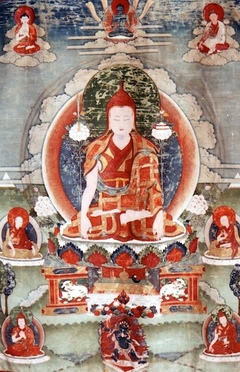Sovereign Nectar
Sovereign Nectar
A Key Instruction on the Practice of Luminosity
by Longchen Rabjam
I pay homage to the one who found a treasury
Of sublime Dharma, ocean-like and profound.
I shall here set out the Sovereign Nectar,
The supreme conduct of the unsurpassed Vajra Essence.
Go somewhere that disturbs the mind,
A place to inspire fear, joy or sorrow—
A forest, an island, or a charnel ground,
A temple, a cattle enclosure, or a town,
An empty building, lone tree, or riverbank.
There, sit properly on a comfortable seat,
Take refuge and generate bodhicitta.
Then, visualize in the sky before yourself
Gurus, yidams, dākinīs, dharma protectors,
And all the beings of the six classes,
Including karmic creditors and harm-doers.
Offer them your own body, flesh and blood,
As well as sensory delights and enjoyments—
Whatever they desire—without holding back.
And, without conceiving of anything at all,
Rest in the equalness of dharmatā.
Then, as figments of your own thinking,
Delusions and influences, demonic and divine,
A variety of experiences will occur—
In reality, in visions, and in dreams.
At such times, there are two crucial instructions:
To understand them based on rational analysis,
And to rest without resistance in the natural state.
1. Rational Analysis
First, rational analysis is as follows.
Whatever figments may manifest,
Consider appearance and existence,
The environment and its inhabitants—
As apparent form, empty of essence.
It is all devoid of parts, lacking reality,
Like an illusion, dream or reflected moon.
Since nothing arises, nothing remains
Or ceases—all is beyond coming and going.
What, this being so, is there to fear?
Sounds are empty from their inception.
Smells, tastes, textures, and objects of mind—
All are devoid of essence, like reflections.
How could you fear or take delight in
Unreal appearances, by nature empty?
Just as the objects of fear are revealed
Through rational analysis to be unreal,
Look within at the mind that is fearful.
This mind is groundless, without origin,
Not locatable in past, present or future—
Unevidenced, not found when investigated.
It has no colour, shape, or characteristics.
What is it then that feels delight or fear?
When objects and mind, perceiver and perceived,
Are thus shown to be unreal,
All phenomena are like space, devoid of self;
And clinging to 'other' is naturally released.
In this naturally arisen primordial wisdom,
Self-luminous and free from elaboration, settle.
2. Resting in Natural Peace
At any time, whether analysing or not,
Everything is unreal, just like a reflection.
There is no need to think so deliberately.
Let whatever arises settle as it manifests.
Apparent existence—saṃsāra and nirvāṇa—
Appears and is by nature empty as it appears.
It is apparent, insofar as it appears as empty dharmatā;
Is empty, insofar as the three realms of saṃsāra are empty;
Is permanent, insofar as the dharmakāya is unchanging;
And is a nihility, insofar as karma and kleśas are absent.
Therefore, whatever appears is not nothing.
Yet nor is there is good or bad, gain or loss,[1]
So rest in the state of groundless equality.
Even divine and demonic visions are unreal.
As they are intangible, they do not merit fear.
The mind that fears is itself inapprehensible:
Since it lacks reality, it requires no dispelling.
Look directly in this way into all such states
Of mind—delight and fear, and all thoughts
Involving the five poisons, and in recognition
Of natural dissolution, rest without resistance.
In wild, haunted places, dualistic grasping will be no more,
And you will reach the level of freedom from hope and fear.
At the same time, as a common accomplishment,
You will bind spirits and demons, who will come to your aid.
This is a means of spontaneously liberating all that you encounter,[2]
And is therefore crucial; so put it into practice!
Through the virtue of this, may all beings
Find freedom in the expanse of the unborn!
This concludes Sovereign Nectar, A Key Instruction on the Practice of Luminosity, composed by Longchen Rabjam, a yogin of the supreme vehicle. May it prove virtuous! Virtuous! Virtuous!
| Translated by Adam Pearcey with the generous support of the Tsadra Foundation, 2025.
Bibliography
Tibetan Edition
klong chen rab 'byams pa dri med 'od zer. "'od gsal sbyong ba’i gnad yig bdud rtsi rgyal po" In snying thig ya bzhi. 13 vols. Delhi: Sherab Gyaltsen Lama, 1975. Vol. 2: 230–233 (2 folios)
Version: 1.0-20251029
